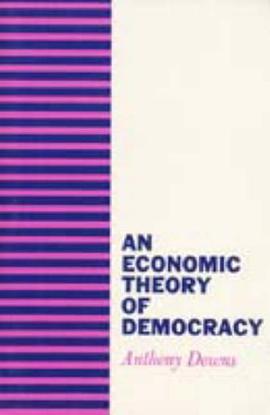An Economic Theory of Democracy
内容简介
This book seeks to elucidate its subject - the governing of democratic state - by making intelligible the party politics of democracies. Downs treats this differently than do other students of politics. His explanations are systematically related to, and deductible from, precisely stated assumptions about the motivations that attend the decisions of voters and parties and the environment in which they act. He is consciously concerned with the economy in explanation, that is, with attempting to account for phenomena in terms of a very limited number of facts and postulates. He is concerned also with the central features of party politics in any democratic state, not with that in the United State or any other single country.
......(更多)
作者简介
Anthony Downs (born November 21, 1930, Evanston, Illinois) is a scholar in public policy and public administration, and since 1977 is a Senior Fellow at the Brookings Institution in Washington D.C..
Downs has served as a consultant to many of the nation's largest corporations and public institutions, including the Department of Housing and Urban Development and the White House. President Lyndon B. Johnson appointed him to the National Commission on Urban Problems in 1967, and HUD Secretary Jack Kemp appointed him to the Advisory Commission on Regulatory Barriers to Affordable Housing in 1989. He is officer or trustee of General Growth Properties and the NAACP Legal Defense and Educational Fund.
He is the author or co-author of 24 books and over 500 articles. His most influential books are An Economic Theory of Democracy (1957) and Inside Bureaucracy (1967); widely translated, both are credited as major influences on the public choice school of political economy. Later, Downs concerned himself with housing policy, writing about rent control and housing affordability.
......(更多)
目录
I. BASIC STRUCTURE OF THE MODEL. 1. Introduction. 2. Party Motivation and the Function of Government in Society. 3. The Basic Logic of Voting. 4. The Basic Logic of Government Decision-Making. II. THE GENERAL EFFECTS OF UNCERTAINTY. 5. The Meaning of Uncertainty. 6. How Uncertainty Affects Government Decision-Making. 7. The Development of Political Ideologies as Means of Getting Votes. 8. The Statics and Dynamics of Party Ideologies 9. Problems of Rationality Under Coalition Governments. 10. Government Vote-Maximizing and Individual marginal Equilibrium. III. SPECIFIC EFFECTS OF INFORMATION COSTS. 11. The Process of Becoming Informed. 12. How Rational Citizens Reduce Information Costs. 13. The Returns From Information and Their Diminution. 14. The Causes and Effects of Rational Abstention. IV. DERIVATIVE IMPLICATIONS AND HYPOTHESIS. 15. A Comment on Economic Theories of Government Behavior. 16. Testable Prepositions Derived from the Theory.
Show More
Show Less
......(更多)
读书文摘
......(更多)






